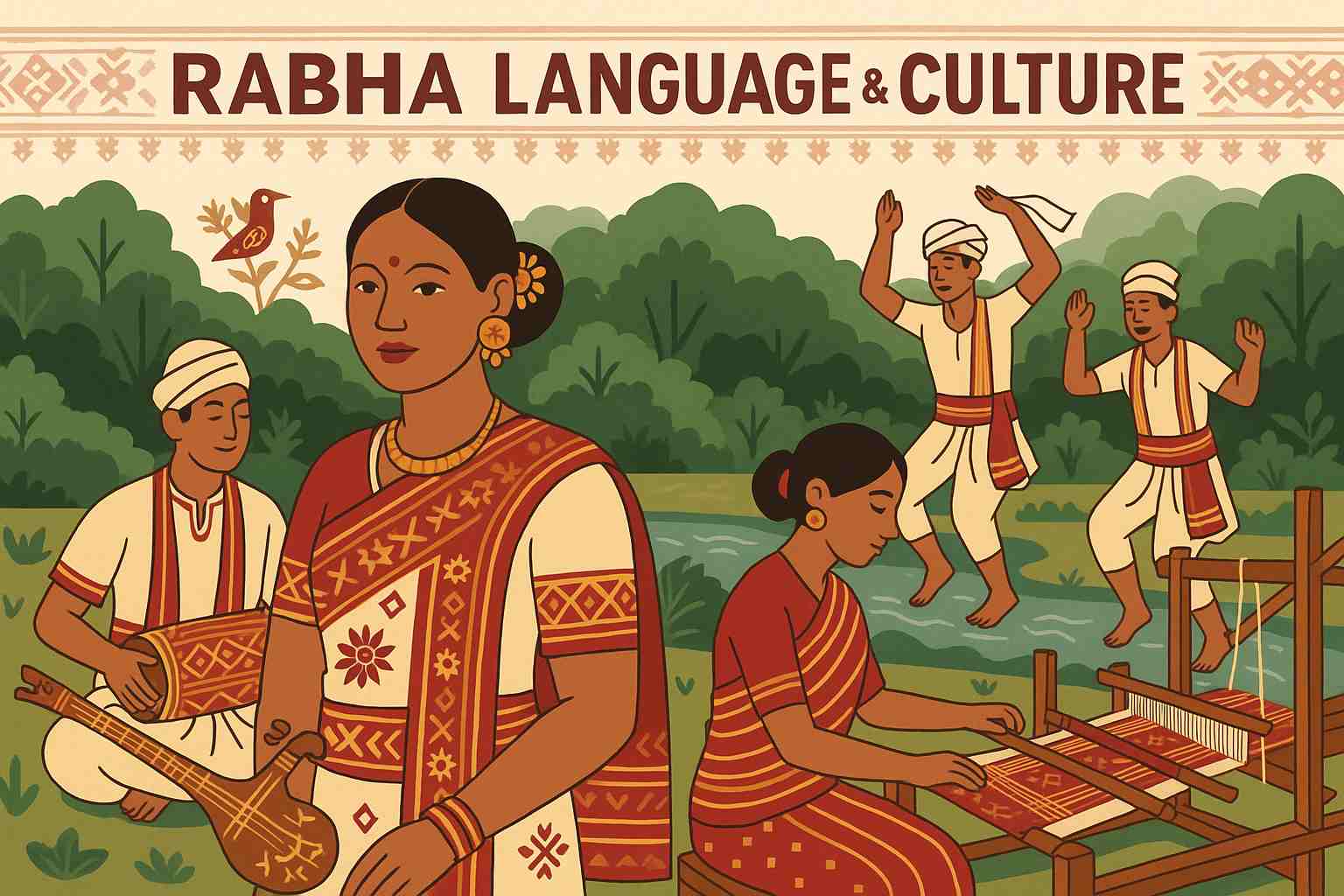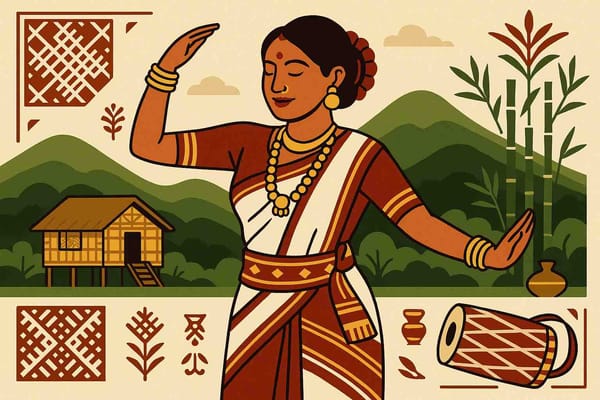
Rabha Culture-Language Explores its Richness
Imagine stepping into a world where the rhythm of the handloom is the village's heartbeat, where stories are not just told but sung, and where life is a beautiful dance with nature. This isn't a forgotten tale; this is the everyday reality of the Rabha community, one of Northeast India's most vibrant indigenous groups. Nestled primarily in the plains of Assam and parts of Meghalaya, the Rabha people hold a cultural treasure trove, a legacy rich with unique traditions, a distinct language, and a profound connection to the earth.
Join me on a journey to understand not just their culture, but the very soul of the Rabha people—a community that contributes so much to the stunning mosaic of Indian heritage.
A Glimpse into the Rabha Way of Life
The essence of Rabha culture is its beautiful simplicity and deep wisdom. It’s a life woven around the cycles of nature. For centuries, they have been an agrarian community, and their entire social fabric reflects this. What's truly fascinating is that many Rabha communities follow a matrilineal system, where lineage and inheritance are traced through the mother. It’s a society where women hold a respected and central place, not just in the family but in the community's cultural and economic life.
Walk through a Rabha village, and you'll see men and women working side-by-side in the fields. You'll see women at their looms, their fingers moving with an inherited grace, weaving colourful traditional attire that tells a story in every thread. They adorn themselves with beautiful beads and silver jewellery, a reflection of their artistic spirit. Their lifestyle is a masterclass in sustainability, a harmonious existence that modern society is only now beginning to appreciate.
The Rhythms of Celebration: Festivals and Art Forms
For the Rabha community, festivals are not just events; they are the lifeline of their communal spirit. They are a time to thank nature for its bounty and to come together as one.
- The Baikho Festival: Held around May, this is perhaps their most important festival. It is a powerful prayer for a good harvest and the well-being of the community. Picture this: the entire village gathers, rituals are performed to appease the deities, and then comes the feasting! Traditional rice beer flows, and delicious pork and chicken dishes are shared among all. It’s a vibrant spectacle of faith, food, and fellowship.
- Artistry in Weaving and Dance: Rabha women are master weavers, creating intricate designs on garments that are both beautiful and deeply symbolic. This incredible craftsmanship is a tradition passed down from mother to daughter. Their artistic expression also bursts forth in their music and dance. The energetic dance forms performed during festivals are a sight to behold, a pure expression of joy and cultural pride. This deep-rooted love for performance is a core part of what makes folk music and dance the defining rhythm of heritage across India. The skills and creations are often showcased in cultural fairs, much like the vibrant gatherings at the Shilpgram Utsav that celebrate local customs.
The Voice of the Ancestors: The Rabha Language
A culture’s truest identity is often found in its language, and for the Rabha people, their language is a sacred vessel carrying generations of wisdom. The Rabha language belongs to the Tibeto-Burman family, a vital part of India's linguistic diversity. It’s not just one single language but a family of dialects, including Rongdani, Maitori, and Kocha, each telling a slightly different story of their migration and history.
This language is the soul of their oral literature. It’s in the lullabies mothers sing to their children, the folktales shared by elders on a cool evening, the proverbs that guide their decisions, and the sacred chants used in rituals. Every word is a connection to their ancestors and their unique worldview. It is this bond between language and daily life that keeps a culture alive and breathing.
Keeping the Flame Alive: Challenges and Preservation
In today's fast-paced world, this beautiful linguistic heritage faces serious challenges. With the growing influence of dominant regional languages like Assamese and Bengali, the number of Rabha speakers, especially among the youth, is declining. Many fear that without conscious effort, this ancient tongue could fade into silence. This is a concern not just for the Rabha community, but for anyone who values cultural diversity.
But there is hope. A growing movement within the community and with support from cultural activists is working tirelessly to keep the language alive. Efforts are underway to document the language, create written literature, and encourage its use in homes and schools. These initiatives aim to instil a sense of pride in the younger generation, helping them see their mother tongue not as a relic of the past, but as a living, breathing part of their identity.
Why This Heritage Is Our Treasure Too
Preserving a language like Rabha is about more than just saving words; it's about protecting a unique way of seeing the world. Every indigenous culture holds solutions to living sustainably and harmoniously, something our modern world desperately needs. The Rabha culture, with its deep respect for nature and strong community bonds, enriches Assam's identity and adds to the magnificent tapestry of India.
At Bhaktilipi, our heart beats for these timeless stories and traditions. We believe that preserving our diverse cultural and spiritual heritage is a sacred duty. We are dedicated to bringing forth the devotional literature and folklore from every corner of India, reimagining them in ways that connect with you today. By exploring these narratives, you can connect with the deep roots of India's diverse spiritual identity.
To continue this journey of discovery with us, subscribe to our newsletter, and join our community on Facebook, Instagram, and YouTube.
A Legacy to Cherish
The Rabha culture is a shining example of resilience and beauty. It’s a reminder that progress doesn’t have to mean leaving traditions behind. By celebrating their festivals, appreciating their art, and supporting the preservation of their language, we can all play a part in ensuring this incredible legacy continues to thrive for generations to come. Let's honour this treasure that not only defines a part of Assam but enriches the very soul of India.
A passionate group of people dedicated to preserving India's knowledge of Dharma, Karma, and Bhakti for ourselves and the world 🙏.
Comments
Related in

Rabha Language Heritage in Assam: A Deep Dive
In the lush, green heart of Assam, where the mighty Brahmaputra river charts its course, a beautiful language carries the stories of ancient hills and forests. This is the language of the Rabha community, an indigenous group whose voice is a living, breathing part of India’s incredible diversity. More
